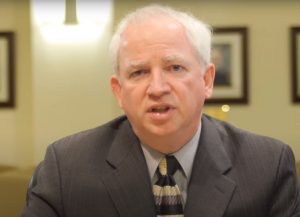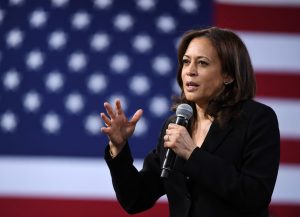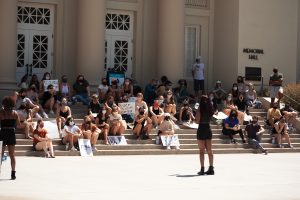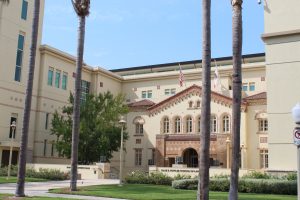
When Chapman University Law Professor John C. Eastman, writing in a national magazine, challenged Democrat Kamala Harris’s citizenship eligibility to be on a national ticket, faculty emails and texts almost blew up.
Is THAT where you teach? Really? THAT’S what Chapman University is like?
For many, the Eastman problem is this: What does it do to Chapman’s reputation as it desperately tries to climb the list of top 100 law schools in the country?
But University President Daniele Struppa — and even some of Eastman’s staunchest critics — say there is a bigger issue at stake than just Eastman’s extremist views on the U.S. Constitution.
It’s freedom of speech.
Even if you find the other guy’s views wacky or offensive.
Struppa issued a sharp rebuke to those who think he should reign in Eastman:
“The university is not responsible for the ideas of its faculty. As president, I will neither endorse them nor refute them… The strength of a university comes in its commitment to free speech and to academic freedom. We cannot simply pick and choose when to support free speech, despite the personal views of the president, provost, dean or any university administrator.”
He’s not alone in that view. One of Eastman’s critics, English creative writing Professor Tom Zoellner, who calls his Eastman’s views on Kamala Harris “stupid,” says a university opens the door to multiple problems if it starts to cherry-pick which professors to go after:
“I think for the university to come out and denounce John Eastman… for the president of the university to slam one of its own professors, that gets into really dangerous territory, I would not respect Chapman University if it did that,” he said.
Eastman, who was once dean of Chapman’s law school, is now on leave as a visiting professor at the University of Colorado-Boulder. He doesn’t see what the fuss is about.
“My personal views don’t enter into my classroom discussions, and they didn’t enter into my role as dean,” said Eastman, whose specialty has long been constitutional law.
Eastman does appreciate Struppa standing up for his right of free speech: “I think he did a good job. Look, I don’t represent this school, neither does any other professor.”
Even so, Eastman’s written views on Harris, the Democratic nominee for vice-president, created a firestorm of controversy. Nationwide, but also at Chapman.
Chapman students and faculty wanted the administration to do something more. Struppa even found concern among his own bosses.
Attorney Wylie Aitken, who is chairman of the Chapman University Board of Trustees, called Eastman’s views “absurd” and wrote in his own piece in the Voice of OC online publication: “One would think that a real scholar would know better.”
UC Irvine law school Dean Erwin Chemerinsky, a noted constitutional lawyer, has repeatedly called Eastman’s view “a truly silly argument.”
Harvard University constitutional law professor Laurence Tribe called the argument against Harris’s citizenship “garbage.”
“I can’t believe people are making this idiotic comment,” Tribe had told the Associated Press.
Eastman expressed his views in an August 12 piece he wrote for Newsweek magazine.
The key to Eastman’s argument is the way the 14th Amendment to the Constitution is written: All those born in the U.S. and subject to the jurisdiction thereof are citizens. Eastman doesn’t deny that Harris was born in Oakland, Ca. But, he wrote:

“Harris was not subject to the complete jurisdiction of the United States at birth, but instead owed her allegiance to a foreign power or powers—Jamaica, in the case of her father, and India, in the case of her mother—and was therefore not entitled to birthright citizenship under the 14th Amendment as originally understood.”
Interviewed by Chapbook magazine, Eastman remains firm despite the criticism:
“She doesn’t meet the constitutional qualification of citizenship.”
The legal scholars point out that the U.S. Supreme Court rejected the basis for Eastman’s very argument more than a century ago. The proof: Harris’s parents were certainly subject to the laws of the state of California. Eastman’s view is such an extreme minority that no one credible even challenged Harris’s name going on the ballot in all 50 states and the District of Columbia.
But while Eastman — and the Newsweek editors — saw this as a strictly constitutional argument, the fallout has been far beyond that. And Newsweek soon realized it.
While the magazine supported Eastman’s right to express his views, it took the extraordinary measure of apologizing to its readers, noting that many have used the Eastman article “to perpetuate racism and xenophobia.”
“All of us at Newsweek are horrified that this op-ed gave rise to a wave of vile Birtherism directed at Senator Harris,” the editor’s note reads.
The controversy has been especially frustrating among faculty and students at Chapman.
Activist student Nguyen Kim Tran, a junior, wrote on Instagram: “I, and many students of color have not felt supported at all by this administration… It’s no wonder why you have a low retention rate of Black students and why many students of color do not feel safe here.”

The Black Student Union held a protest soon after the Eastman article was published complaining about a host of issues where it found the administration lagging behind. The Eastman incident was just one of its arguments.
The Black Student Union considered Eastman’s argument so racist that it wrote to Struppa asking for stricter guidelines when reviewing professors for tenure. Struppa wrote back that a lot of factors go into tenureship and the review process is thorough.
But the Black Student Union as a group responded: “When faculty like him are given tenure status, the university is ultimately granting them free range to express racist and harmful views to thousands of students over many, many years.”
It added: “How did he wind up in a position of power in the first place?”
Eastman joined the Chapman faculty in 1999 to teach law and was dean of the law school from 2007 to 210. He left that role to run in the 2010 race for California attorney general. He was one of several losing candidates. The winner: Kamala Harris.

Eastman has long been criticized by faculty and students for his harsh views opposing same-sex marriage (he was the former chairman of a national organization that makes that its main cause), and his right-wing views on immigration. Now President Donald Trump has been slipping in Eastman arguments against Harris’ eligibility on the campaign trail.
The Chapman administration has not stood on the sidelines on the national protests over the police killings of black citizens. It issued a statement on its own Instagram:
“We believe Black Lives Matter. Tap the link in our bio to learn more about how we can find our path forward together.” Struppa has also made strong statements supporting the reasons behind the police protests. But most of the 300 comments in response to his Black Lives statement were negative on Instagram.
Lisa Leitz, Chapman’s Department Chair of Peace Studies started a faculty petition in response to Eastman. Several hundred faculty have signed. Leitz and her supporters want to see Chapman more up front about racial issues, and that includes the Eastman article.
“We ask that Chapman’s administration make a statement about our university’s values relating to diversity and inclusion, and reaffirm its commitment to moving forward with initiatives and leadership on these issues at Chapman,” the petition reads.
The petition strongly denounces the Eastman case against Harris, calling it:
“Poorly argued, inaccurate, and racist.”
Many argue the problem isn’t just what the article says about Eastman’s claim to be a constitutional scholar. What does it say about Chapman?
Guess who said he would have signed that petition, if he had been eligible? Wylie Aitken, the Chapman trustees chairman. He said so in an op-ed piece he recently wrote for the Voice of OC.
For Aitken, it’s not just that he found Eastman’s view arcane. He worries what all the attention means for Chapman’s reputation. Aitken wrote:
“One has to question his loyalty to his school, students, and alumni to subject them to such potential ridicule from its legal peers, including law school deans and faculty throughout the United States. . . putting in jeopardy Chapman’s dramatic rise in the national rankings.”
Chapman once boasted when it cracked that Top 100 law schools in the U.S. ranking. But now it hovers several points down from that. Aitken doesn’t think Eastman is helping any.
Struppa has not stayed out of the mainstream media limelight.
The Los Angeles Times, in a comment piece written by veteran columnist Michael Hiltzik, chided Struppa for not taking a stronger stand against Eastman: “Should Chapman go further to disavow Eastman’s op-ed? The answer is yes.”
Hiltzik added:
“No one is suggesting that Eastman lose his job over his views, but that doesn’t mean that Chapman can’t take a stronger stand on its own. Its reputation, after all, is on the line, whether it likes it or not.”
Leitz, who started the petition, also questions what this does to Chapman’s reputation.
“Chapman is being associated with the vilest notions of anti-immigrant sentiment and racism, via birtherism,” she wrote in a note with the petition.
Study Breaks, a national student-run magazine, recently ran as its top story a piece about Eastman, with the headline: “Why is it so hard for Chapman University to Condemn Bigotry?” The magazine theorized that Chapman would not act on Eastman until the controversy is “public enough to damage the school’s reputation.”
Also worried are the faculty at the University of Colorado Boulder, where Eastman is teaching this fall. Its Chancellor Phil DiStefano wrote to its faculty:
“Even if he did not intend it, Professor Eastman’s op-ed has marginalized members of our CU Boulder community and sown doubts in our commitment to anti-racism, diversity, equity and inclusion.”
Yet, Eastman remains in good standing there.
The University of Colorado Boulder chancellor stood by Eastman’s right to free speech, and would not rescind its invitation for him to teach there this Fall Semester.
Even Chapman faculty petitioners recognize the freedom of speech issue:
“We do not seek to prohibit Professor John Eastman from publishing his works, as the academy is founded on free speech.”
But Professor Zoellner, a major critic of both Eastman and Donald Trump, may have summed up how most on campus feel:
“I think John Eastman made a fool of himself, but he has the freedom to make a fool of himself,” Zoellner said.
